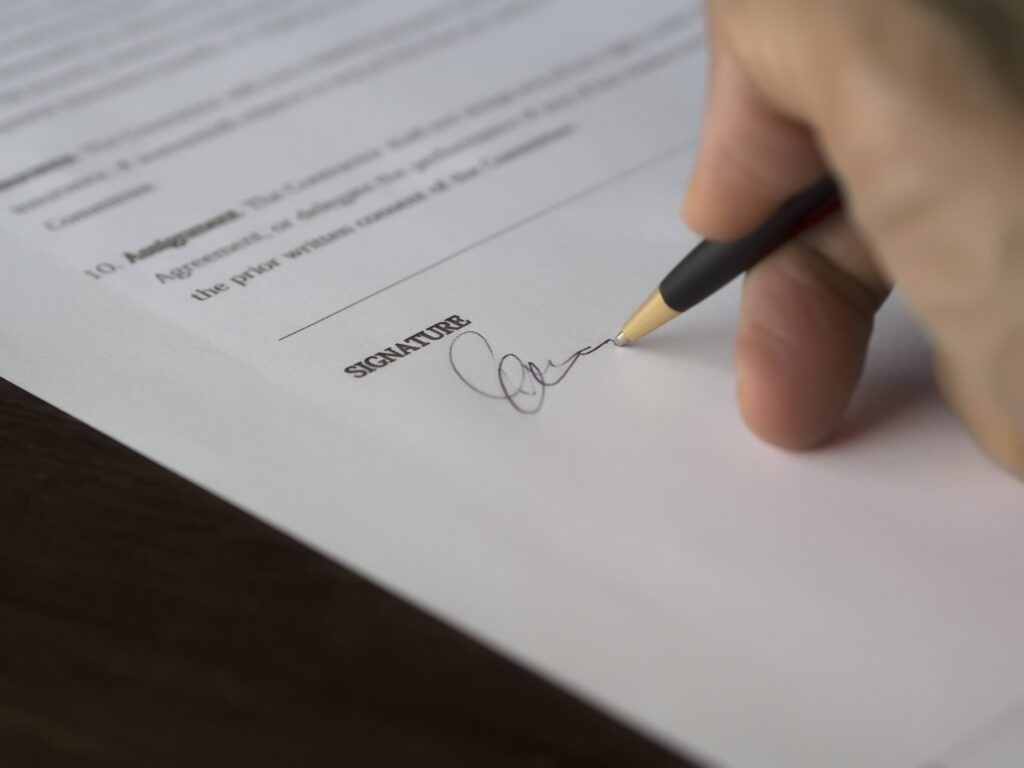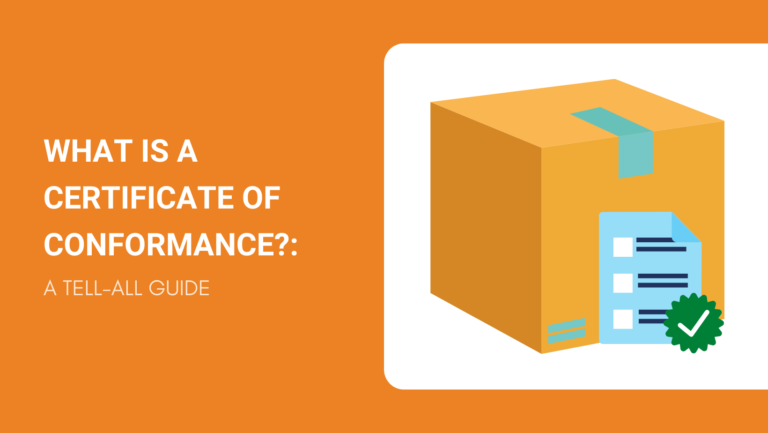Buying things from different suppliers from around the world doesn’t only involve dealing with invoices. You also need to know about the necessary certifications your suppliers should provide along with the goods.
You need to present these documents at the time of import and in most cases, these documents give you a certain level of surety about the goods even before you receive them.
This article explains everything you need to know about an important document known as a certificate of conformance.
Let’s start.
What Is a Certificate of Conformance?
The certificate of conformance is a written surety from a supplier or manufacturer which confirms that the products conform to all the local and international standards of quality and safety.

You may know about the imported products but this certificate generally helps other persons understand the products easily.
So, in a way, this certificate sets the parameters for a product and what others can expect out of them.
For example, an advanced battery can look like an explosive to the customs clearance authorities. The certificate can give them a better idea about the items.
If the product deviates from the description, there may be implications.
Abbreviated as CoC, it is also called a certificate of conformity or the certificate of compliance.
It is also known as the general certificate of conformity (GCC), especially in the EU.
Why Are Certificates of Conformity Required?
There are many objectives of the certificate of conformance. The important ones are discussed below.
Supplier’s Guarantee
When you procure products from another source, you require a guarantee from the supplier that the products are of the required quantity.
This certificate provides this guarantee to give a certain level of confidence in the products.
Import Requirement
When importing products from another country, you have to provide certain documentation at the port.
They may require certificates and documents like the original invoice, the bill of lading, the certificate of origin, etc.
You may also have to present it at the time of customs clearance.
While it is a mandatory requirement for importing dangerous or sensitive goods, it may also be required against general products.
Legal Selling Requirements
Depending on a country’s product requirements, it may also be a legal obligation of a company to show the certificate of conformance so that it is eligible for selling those products.
The certificate also ensures that the products are not banned and illegal to import or sell them in the country of destination under any law.
That’s why you should know the laws about banned products in your country before importing them.
While the authorities may not ask for it, you must have all the documentation ready to avoid any surprises.
Benefits of Certificate of Conformance
The certificate of conformance may seem to be a simple document but it may have many benefits. Some of them are briefly discussed below.

Develops Trust
This ordinary routine certificate is a crucial document that can develop trust between a seller and a buyer.
You may not know about a supplier and his reputation if you haven’t done business with him in the past. Written documents can bridge the trust deficit between two parties.
We can say that the certificate of conformance is one of the initial steps towards building a professional or a business rapport.
Elevates a Company’s Image
The certificate of conformance elevates a company’s image in the eyes of buyers. The buyers may already be satisfied with the products but the certificate revalidates their professional image.
It applies to sourcing products from the origin and selling them in the destination country.
Product Specification
You can also leverage the certificate of conformance in your product specification. It just adds weight to your products.
You can also split the information in your CoC to increase the impact. For example, if your CoC complies with multiple standards, you can make separate points in your product specification like below.
- Quality compliance: Passed
- Safety standard: Passed
- Legal status: Approved
These details can improve the impression and sales of your product.
If a third party has issued the certificate, you can also mention its name to provide transparency.
Timely Product Launch
In case the certificate of conformance is an essential prerequisite in your country before selling a product, obtaining it on time prevents you from having delays in your product launch.
If you haven’t acquired this certificate for your products, you will have to wait until the supplier provides it and you have to store your products in your warehouse.
Your investment will be stuck, the business cycle will be delayed, and storage charges will increase. It will decrease your profit margins even if you start selling the products after acquiring the certificate.
As the timing to launch the product is crucial for a business’s success, you may even lose to your competitors as they may take the lead while you wait for the certificate.
Shapes Your Company Policy
It can play a supporting role while you develop your official business website. You can mention on your “About Us” page that you have product safety rules and that whatever you sell is backed by proper documentation.

You may also announce information transparency under your “Terms of Service” or “Privacy Policy” pages that you import legal and quality compliant products.
You can offer your customers the original certificate of conformance if required.
Most probably, your customers won’t have time to ask for the certificates if they are satisfied with their purchase but it will help them buy confidently from your website.
Speeds Up Your Shipment
The correct certificate of conformance speeds up the shipment process. It helps your products ship on time from the source country. It also expedites the import process in the country of destination.
What Is Required on a Certificate of Conformance?
The following details are required on a certificate of conformance.
Manufacturer’s Contact Details
A typical certificate of conformance will hold the name of the manufacturer or the supplier who has provided the certificate. It should essentially include the factory’s address.
As additional information, a certificate may also provide the phone and fax numbers of the manufacturer on the certificate.
Product Details
A good certificate of conformance provides the required specifications and details of the products explaining what the product is and may also hint at its possible uses.
It can be a one-liner or a detailed description depending on the product.
Product Testing Information
It refers to the information regarding the labs and the testing techniques that were used while testing the product to inform the reader about when and where the products were tested.
Ideally, it should also mention the procedures used to validate the products.
Generally, a sample of a few products is taken from the batch which is tested randomly.
Importer Information
The certificate should also mention the details of the importer who has acquired it and is presenting it in the destination country. He is the holder of this certificate and is responsible for those products in the destination country.
Quality or Safety Regulations
The safety or the quality standards that were used to verify that the products conform to the set standards must be mentioned on the certificate.

What Details Should a Certificate of Conformity Include?
The details on a certificate of conformance can vary according to the types of products.
We have briefly overviewed this information above, let’s check what a standard certificate of conformance includes.
Certificate Number
A proper certificate has a number to ascertain if an issuing company has issued the first certificate or is a continuation of a regular practice.
This number is also helpful in tracing back the document issued. It checks for its originality and helps in future correspondence.
Issuer’s Name
The certificate should have the company name mentioned on the certificate, preferably on the top. Most certificates have the company’s logo as well.
Importer’s Details
The certificate should also mention for whom the certificate is issued. This is to ascertain that the importer is producing the certificate that was issued solely for him by the manufacturer.
Product Information
The certificate should have all the necessary details of the product. Ideally, the information should include the following details.
- Product name
- SKU numbers
- Quantity
- Short description – Outdoor full-color LED display.
Standards Used
The certificate should mention the local or international standards used to check the products for safety and quality. For example, the company should mention if the products conform to the ISO standards.
Date of Issuance
The certificate should mention on which date it was issued. It is to confirm if the certificate is issued afresh or if an old certificate is being produced. The issuing authority signs most certificates.

What Types of Products Require Certificate of Conformance?
Although this certificate may be required for every kind of product, the following are a few examples for which this certificate is usually required.
- Health products
- Children’s products
- Special textiles
- Bicycle helmets
- ATV (All-Terrain Vehicle) products
- Bunk beds
- Consumer electronics
- Machinery
- Toys
- Sunglasses
- Personal protective equipment
What Is the Difference between a CoA and CoC?
CoA refers to the certificate of analysis. It is slightly different from the certificate of conformance.
CoC may or may not have any specific test details. It can be as simple as the declaration from the manufacturer itself as a personal guarantee that the products conform to the general standards.
It is issued for general products and is merely considered a formality. It may even not be required in most cases.
CoA involves specific test details. It is issued against specialized or more sensitive products such as cannabis or any other form of drug or medication.
It can look like a test report with predefined parameters followed by the test results.
The sensitive products are not generally allowed without producing the CoA.
Contrary to the CoC, end-users also require CoA for specific products before using them. So, the CoA is more relevant to consumer product safety.
How to Get a Certificate of Conformance?
You can ask your supplier to provide the certificate of conformance along with the products. Most experienced importers ask about this document while finalizing the deal with the supplier.
The buyer can make the CoC necessary for the transaction. It is a kind of agreement between both parties that the products will be certified.

Even if a supplier is unaware of this certificate, he may get guidance from the buyer and provide this certificate as most of the content has to be validated by himself.
If your supplier is a wholesaler and is not a manufacturer, he may have already acquired the CoC from the manufacturer or may get you one on your demand.
FAQs about Certificate Of Conformance
The following frequently asked questions will further help you understand the certificate of conformance.
What Is a COC in Logistics?
The abbreviation of COC may imply a different meaning in logistics. While the term “certificate of conformance” is also used in logistics, COC generally refers to “Carrier-Owned Container” in logistics.
It is a general practice in the logistics field to use third-party containers. So, the COC affirms that the carrier company is using its containers. It gives an additional sense of protection and exclusivity to the users.
What Is the Cost of a CoC?
As an importer, you should not pay any extra costs for obtaining the CoC. This certificate should come naturally as a supporting document with your products.
It should also not cost anything to the supplier as he only has to validate his products on a piece of paper.
It can cost a few bucks in case the certificate has to be acquired by a third-party certification agency. In that case, the one who wants the certificate from the third party would have to pay for the costs.
If the quality inspection requires specific tests to be performed, the costs of the certificate may go up depending upon the type of the tests and the number of items in a sample to be tested.
Is a Certificate of Compliance the Same as a Certificate of Conformance?
While both terms are used interchangeably, there is a minor difference between them.
A certificate of conformance is a general term that implies that the products conform to the general quality or safety standards.
A certificate of compliance refers to compliance against specific standards. Some countries may have laws that require products to show compliance against specific tests.
You can say that the supplier of the importer is forced to acquire the certificate of compliance while acquiring a certificate of conformance is done voluntarily or by default.
What If the Certificate of Conformance Is Fake?
You can’t trust a supplier blindly. A supplier can also issue a fake certificate of conformance that is not backed by any safety or quality standards.
There may be no tests performed and the letter may be produced just as a formality. If you don’t trust the supplier, you can ask him to share the extra details of the tests performed.
If the tests were performed by a third party, you should ask for its contact details and verify the same.
You should especially do this in the case of sensitive goods – children’s products.
Conclusion
The certificate of conformance is a document that you should always obtain from your suppliers. It secures your import deal and you also know if your supplier cares about the standards or specifications of the products.
Some documents are crucial to have for a business. Their presence may not make a big impact but if you don’t have them, you can face troubles. You can consider CoC as one of such documents.
Do you want to import products with all the required documents from the best suppliers in China? Ask for a free quote and it may be one of the best decisions you will ever make.

